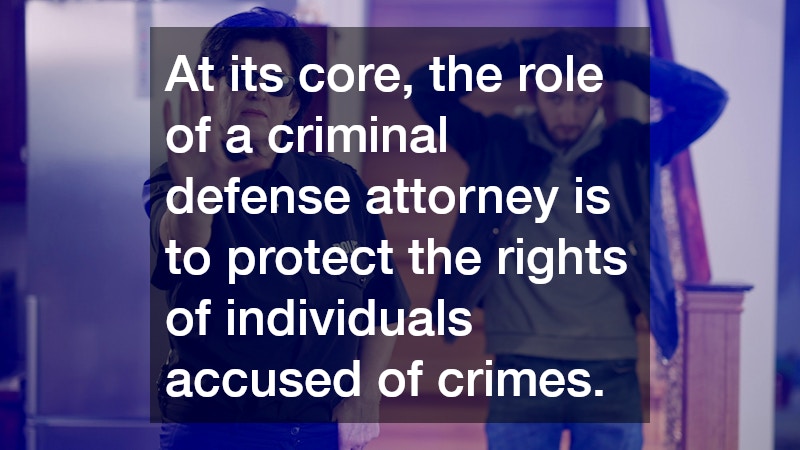When people hear the phrase criminal defense attorney, they often picture a single type of lawyer — someone standing in a courtroom defending a client accused of a serious crime. While that image is accurate in some cases, it doesn’t tell the whole story. In reality, there are several different types of criminal defense attorneys, each with distinct roles, specialties, and areas of expertise. Understanding these differences can help individuals make informed decisions when facing criminal charges and ensure they receive the right kind of legal representation for their unique situation.
Understanding the Role of a Criminal Defense Attorney
At its core, the role of a criminal defense attorney is to protect the rights of individuals accused of crimes. This involves investigating the case, reviewing evidence, interviewing witnesses, negotiating plea deals, and representing the client during trial. The ultimate goal is to achieve the best possible outcome — whether that means dismissal of charges, a reduced sentence, or an acquittal.
Criminal defense attorneys can work in private practice, as part of a law firm, or as public defenders employed by the government. While all criminal defense attorneys share the same fundamental goal — defending their clients — the way they operate and the cases they handle can differ significantly based on their type, specialization, and level of experience.
Specializations Within Criminal Defense Law
Beyond the distinction between public and private counsel, there are many specialized types of criminal defense attorneys, each focusing on different areas of criminal law. Some of the most common include:
1. White-Collar Crime Attorneys
White-collar crimes involve non-violent offenses committed for financial gain, such as fraud, embezzlement, insider trading, and money laundering. Attorneys who specialize in white-collar defense often have experience with complex financial regulations and federal investigations. They must understand intricate paper trails, corporate structures, and compliance laws.
2. DUI and Traffic Defense Attorneys
Driving under the influence (DUI) is one of the most common criminal charges in the United States. DUI defense attorneys focus on cases involving impaired driving, reckless driving, or vehicular manslaughter. These lawyers are well-versed in local traffic laws, breathalyzer accuracy, and police procedure. Their work can include challenging the legality of a traffic stop or the accuracy of blood alcohol concentration (BAC) testing.
3. Violent Crime Defense Attorneys
Cases involving assault, robbery, domestic violence, manslaughter, or murder require a deep understanding of both state and federal criminal laws. Violent crime attorneys often deal with emotionally charged situations and complex evidence such as forensic reports and witness testimonies. These cases frequently go to trial, making courtroom experience essential.
4. Drug Crime Defense Attorneys
Drug-related offenses vary widely in severity, from simple possession to large-scale trafficking. Defense attorneys specializing in drug cases must be knowledgeable about search and seizure laws, evidence handling, and sentencing guidelines. They often challenge how evidence was obtained or question whether a defendant’s rights were violated during an arrest.
5. Federal Crime Defense Attorneys
Federal crimes are prosecuted in federal court and often carry harsher penalties. Examples include tax evasion, kidnapping across state lines, and cybercrime. A federal criminal defense attorney must be admitted to practice in federal court and be familiar with the Federal Rules of Criminal Procedure, which differ from state-level systems.
6. Juvenile Defense Attorneys
Juvenile defense attorneys represent minors charged with crimes. These cases differ significantly from adult criminal proceedings, emphasizing rehabilitation over punishment. A juvenile defense attorney must understand not only criminal law but also family and education laws that intersect with youth cases.
7. Appeals Attorneys
Sometimes, even after a conviction, a person may still have legal options. Appeals attorneys specialize in reviewing cases for errors made during trial and arguing for reversals or new hearings. This type of work requires exceptional research and writing skills, as appeals are usually decided based on written briefs and legal arguments rather than witness testimony.
Conclusion
The term criminal defense attorney encompasses a wide range of professionals who defend individuals accused of crimes, from misdemeanors to serious felonies. Whether a person works with a public defender, a private attorney, or a specialist in a specific area of criminal law, the goal remains the same: to safeguard the client’s rights and ensure a fair legal process. Understanding the different types of criminal defense attorneys — and the unique expertise each brings to the table — empowers defendants to make informed choices and increases the likelihood of achieving the best possible outcome in their case.




